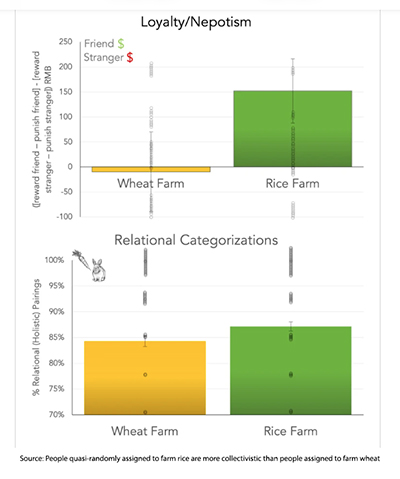Rice farming involves a more complex irrigation system and subsequent labor needs than wheat farming. Traditional rice farming ties farmers tightly together in interdependent relationships.
“The rice theory of culture argues that the high labor demands and interdependent irrigation networks of paddy rice farming makes cultures more collectivistic than wheat-farming cultures.”
But proving this theory is difficult especially given several confounders. A study in Nature Communications uses a unique moment in China’s history to explore whether rice farming causes these cultural differences.
The researchers identified a period after World War II when the Chinese Communist Party created new state farms, assigning former soldiers and urban youth needing “re-education” to two farms, roughly 30 miles apart – sharing similar temperatures, rainfall, and acreage, with “a minor difference in the topography allow[ing] one to farm rice and the other wheat.”
The nature of this decision by China’s central authority fortuitously, at least for the researchers, eliminated three difficult confounders to a study of this type.
- There was no self-selection – “The government was not concerned with modern ideas of occupational interest questionnaires or personal choice. … the top-down assignments of the Cultural Revolution sent many youth to the countryside with very little preparation or forethought to placing the right individual in the right area.” 99% of all the new “farmers” were from China’s wheat provinces.
- Nearly identical environments – the government was set on opening up new land for farming, and these areas had no real history of rice or wheat farming.
- There were no economic policy differences – both farms belonged to the same land reclamation group. They were moved from a system of collective to individual profits at the same time, meaning “the two farms had the same profit structures and incentives.”
The researcher considered three measures shown to be “rice-wheat differences” in China – self-importance, loyalty/nepotism, and holistic thinking.
The results showed more cultural markers of collectivism among farmers on the rice farm than the wheat farm. Rice farmers showed less implicit individualism …, more loyalty/nepotism, and more holistic thought than wheat farmers. These differences were not explained by any of the demographic characteristics we measured.”
 Self-inflation, how you perceive your importance, was measured by asking participants to draw networks of their family and friends and then draw circles around each member in the network. Individualistic societies, like our own, tend to draw larger circles around ourselves. Wheat farmers had larger circles around themselves, implying a perceived greater importance, but not so for the rice farmers.
Self-inflation, how you perceive your importance, was measured by asking participants to draw networks of their family and friends and then draw circles around each member in the network. Individualistic societies, like our own, tend to draw larger circles around ourselves. Wheat farmers had larger circles around themselves, implying a perceived greater importance, but not so for the rice farmers.
To test loyalty and nepotism, farmers were asked to imagine a business deal with a friend who lies, resulting in a loss for the farmer, who could then punish his friend by paying a small fee to take from his friend’s bank account. A second scenario involves an honest friend who could be rewarded and a third and fourth task uses the same scenario with a stranger. Treating the friend better than the stranger could reflect the positive quality of loyalty or the negative quality of nepotism.
 Rice farmers were more loyal/nepotistic than wheat farmers, punishing the stranger more harshly than the wheat farmers.
Rice farmers were more loyal/nepotistic than wheat farmers, punishing the stranger more harshly than the wheat farmers.
To measure holistic thinking, the participants were shown an object, like a rabbit and asked to choose a second related object, in that instance, another mammal or a carrot. Holistic thinking is less abstract than what we might deem more Western thinking; it is more relational. Rice farmers were more holistic in their cultural perspective than wheat farmers, choosing a relational pairing 90% of the time. For comparison, a similar test of American college students found relational pairing 60% of the time.
“Farmers on the state rice farm showed more hallmarks of collectivistic culture than farmers on the nearby state wheat farm. Rice farmers were more loyal/nepotistic toward friends, thought more holistically, and showed less implicit individualism than the nearby wheat farmers.”
The study has limitations, primarily the difficulty of farmers completing tests designed for college students, making the statistical significance less sure. However, the study sheds some light on cultural differences. Most uniquely, the “quasi-randomization” in the top-down decision by a central government to arbitrarily assign its citizens to one or another form of farming significantly reduces the influence of genetics. As the researchers write,
“While genes evolve with cultural practices, the assignment makes genetics less likely as an explanation for rice-wheat differences.”
That said, there can be little doubt that our environment does indeed shape our culture – in this instance, the interdependence of rice farmers may “lead to more collectivistic cultures.” While rice and wheat farming has been present for millennia, the differences in cultural attitudes among these farmers appeared within one generation, 70 years. This study adds a bit more evidence to the long-held but still unproven theory that the subsistence style of life in the East accounts for its collectivism and differences from the West.
Despite its limitations, the research offers compelling evidence that our environment molds our cultural attitudes.
Source: People quasi-randomly assigned to farm rice are more collectivistic than people assigned to farm wheat Nature Communications DOI: 10.1038/s41467-024-44770-w




